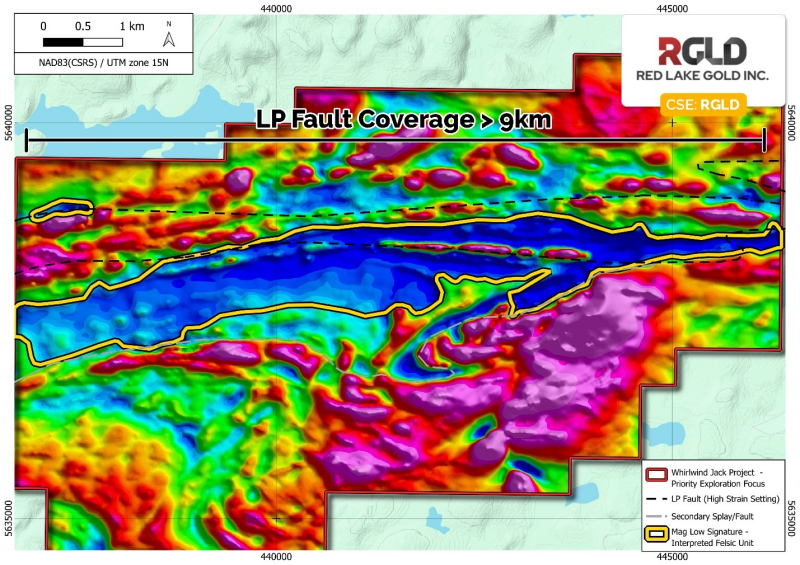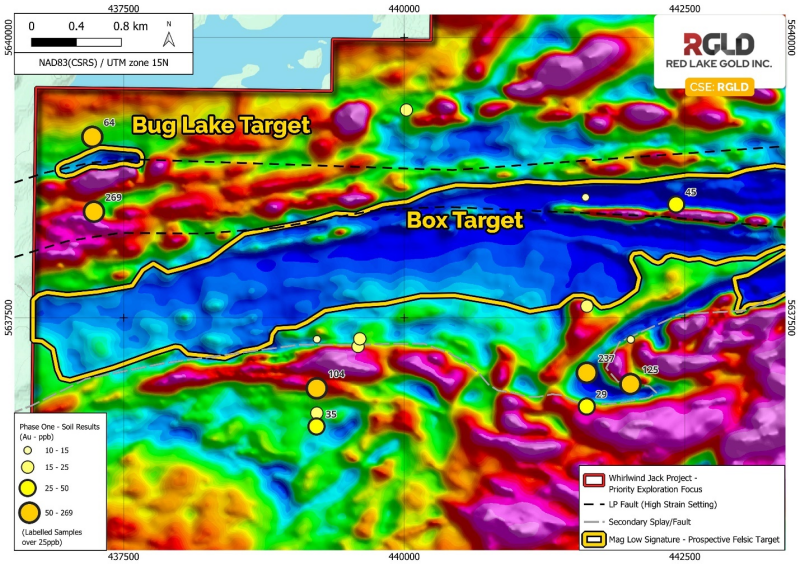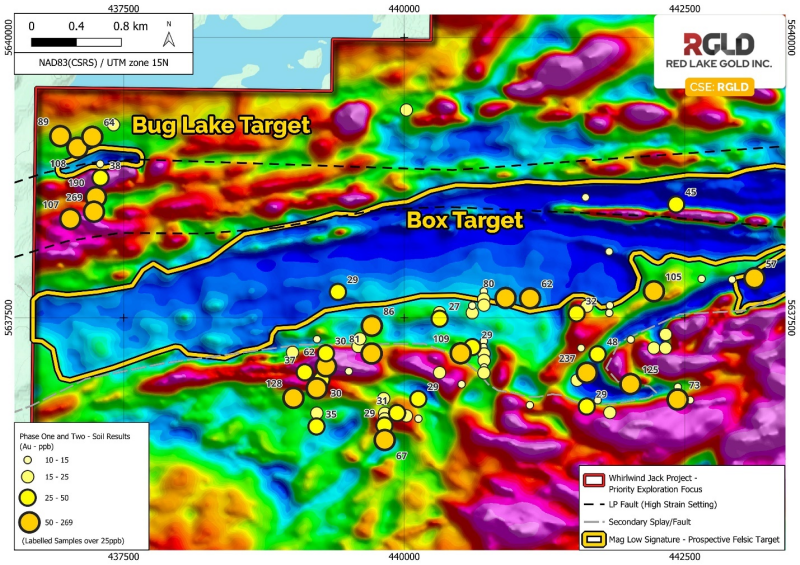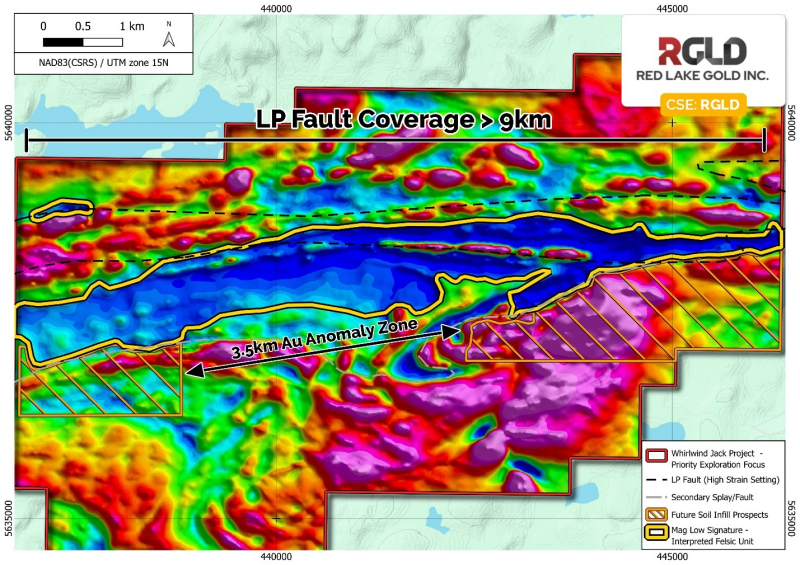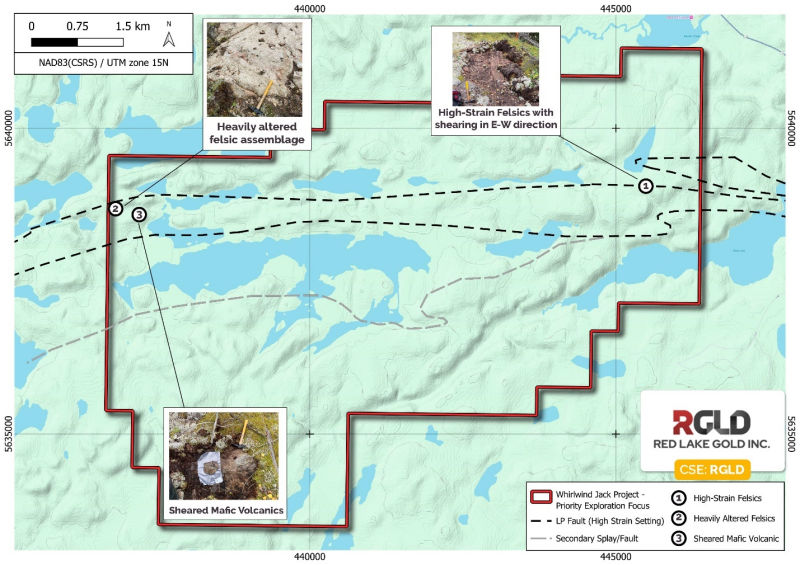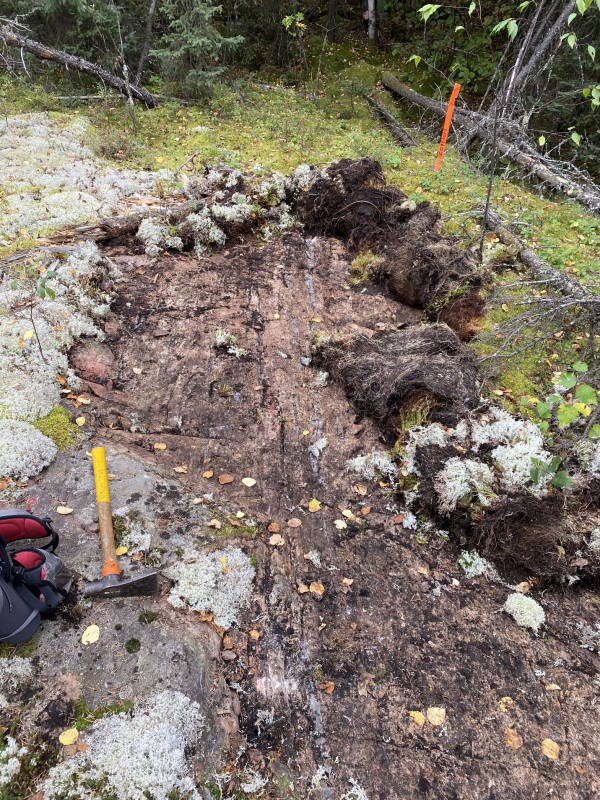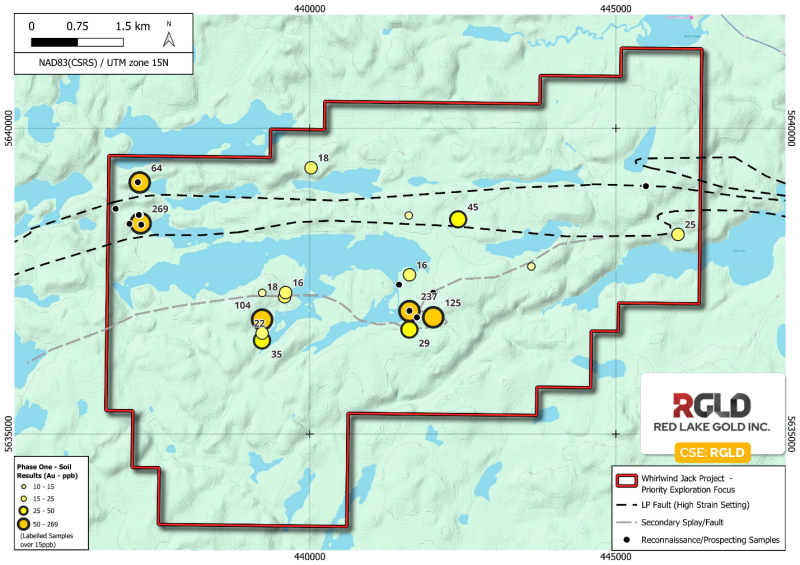Red Lake Gold Inc. Reports Strong Gold-In-Soil Results and Highlights Multi-Kilometric LP Fault Gold Target Setting
 | |||||||||
 |  |  | |||||||
Vancouver, British Columbia – TheNewswire - November 21, 2024 - Red Lake Gold Inc. (CSE: RGLD)(“Red Lake Gold” or the "Corporation") reports upon the material results (and the Corporation’s related analysis) pertaining to the recent phase two soil sampling program and the prospecting program which were both undertaken this fall at Red Lake Gold’s Whirlwind Jack Gold Project (“Whirlwind Jack” or “Whirlwind Jack Project”) located near Red Lake, Ontario (see also news release, Red Lake Gold Inc. Deploys Prospecting and Soil Sampling Teams to Priority Areas at Whirlwind Jack, dated October 1, 2024). Said results are detailed and discussed herein.
Regional Overview
Red Lake Gold is focused on Whirlwind Jack and is of the opinion that the project shares a multitude of geological features with the adjoining Great Bear Project (“Great Bear”) being independently advanced by Kinross Gold Corporation, including:
-
LP Fault Coverage (exceeding 9km on Red Lake Gold’s Whirlwind Jack);
-
Geophysical Magnetic Low Corridor (interpreted to be felsic lithologies due to a similar magnetic low that is coincident with felsic lithologies at the adjacent Great Bear Project);
-
High Strain Felsic Lithologies (discussed within Field Prospecting Highlights below, felsic lithologies confirmed as present on both the Great Bear Project and Whirlwind Jack Project).
In addition, Whirlwind Jack is now further highlighted by the strong gold-in-soil results presented in this news release (see Soil Sampling Highlights and summary Figure 3 below), which expand upon the phase one gold-in-soil results previously disclosed (see news release, Red Lake Gold Inc. Identifies Gold-In-Soil Anomalies, Highlights Multi-Kilometre Target Area Adjoining LP Fault, dated August 13, 2024).
The gold-in-soil results reported herein (see Soil Sampling Highlights and summary Figure 3 below) are within a multi-kilometre area corresponding to the central portion of Whirlwind Jack’s magnetic low, which coincidently is similar in terms of project positioning to the adjoining Great Bear Project (where the central portion of that project’s respective LP Fault strike length coverage has been the adjacent project holder’s focus). The centre of the Whirlwind Jack gold-in-soil anomaly is approximately 15km from the centre of the Great Bear Project gold discovery. Generally-speaking, this observation is relevant in the view of the Corporation as gold belts are commonly associated with a major regional fault but deposits themselves are often situated along strike with distances between one another (i.e. leveraging independent strike areas along common sutures for fluid aggregation/mobilization).
Figure 1: Whirlwind Jack Gold Project (Geophysical Map with LP Fault)
For among the reasons outlined in this news release and elsewhere in the Corporation’s publicly-filed documents, Red Lake Gold believes Whirlwind Jack may represent an opportunity to discover the next on-trend gold discovery associated with the LP Fault, a regional fault structure for which coverage is materially dominated by mining claim and/or lease ownership held by neighbouring Kinross Gold Corporation (Great Bear Project) and Red Lake Gold Inc. (Whirlwind Jack Project), respectively.
The Corporation cautions that the exploration potential of and any exploration results from the Whirlwind Jack Project may differ, materially, from exploration results of adjoining and/or regional projects, including but not limited to the adjacent Great Bear Project being advanced by Kinross Gold Corporation.
Soil Sampling Highlights
Laboratory assays for 579 out of 690 follow-up phase two soil samples collected this fall were first received by the Corporation on November 15, 2024, with an additional 12 sample assays subsequently received on November 20, 2024. Given that the significant majority of lab assays are now returned, the Corporation's assessments contained in this release are considered representative of the soil program at Whirlwind Jack. The Corporation has prioritized the disclosure of received results given its view of their materiality versus delayed reporting to wait on the outstanding balance. Red Lake Gold does not expect to separately report on the small number of outstanding samples unless their aggregate assay results are materially different in scope or range than the ~86% of all collected phase two soil samples for which assays are now in-hand and which are being reported on by way of this comprehensive news release.
To those received results, the Corporation is pleased to advise of a significant expansion of the gold-in-soil anomalies at both the Bug Lake Target and the Box Target as compared to the initial phase one results (see also news release, Red Lake Gold Inc. Identifies Gold-In-Soil Anomalies, Highlights Multi-Kilometre Target Area Adjoining LP Fault, dated August 13, 2024).
The cumulative soil sampling that was undertaken and completed at Whirlwind Jack this year has now successfully delineated a widescale gold-in-soil-anomaly at the Box Target that is aligned with the project’s significant magnetic low corridor (believed to be underlain by felsic lithology) and appears to also be associated with Whirlwind Jack’s coverage of the regionally important LP Fault. The Bug Lake Target also exhibits strong and expanded gold-in-soil results and likewise appears to have a magnetic low and LP Fault relationship.
As noted, the phase two soil sampling follow-up/infill results showed material growth in scale and technical continuity of the Box Target gold-in-soil anomaly which the phase one soil program provided what is now believed to have only been an initial glimpse of, as well as having materially expanded the above-discussed Bug Lake Target gold-in-soil anomaly (see Figures 2 and 3 below for highlighted result summary and phase comparisons).
Based upon the received results from Red Lake Gold’s phase one and phase two soil sampling programs, combined with the field observations/findings of the fall prospecting program, the high-priority Box Target gold-in-soil anomaly is viewed by the Corporation to be locally dispersed from within Whirlwind Jack’s main magnetic low corridor (see also the Field Prospecting Highlights section below).
Figure 2: Phase One Soil Sampling Highlights (previously released in August 2024)
Figure 3: Phase One and Two Soil Sampling Highlights (as received to November 20, 2024)
In the Corporation’s opinion, the emerging gold-in-soil-anomaly associated with the Box Target – which as of now has a prospective length of approximately 3.5km (see Figure 4 below) and which runs parallel to the LP Fault-associated magnetic low corridor at Whirlwind Jack – exhibits a similar strike length to the adjacent Great Bear Project, where an approximate 4km area of strike has received focus.
Figure 4: Gold-In-Soil Anomaly Scale and Future Soil Infill Prospects
As shown above in Figure 4, the approximately 3.5km gold-in-soil anomaly identified at Whirlwind Jack presents an opportunity for expansion along strike with the LP Fault in both directions as the extent of phase two soil sampling completed this fall did not cover or explore the indicated areas either to the east or to the west of the now defined gold-in-soil anomaly, but which given the results disclosed today now present obvious future soil infill prospects to incrementally assess over time.
Priority for the Corporation will be to determine next steps for refining targets to test the initial 3.5km strike length of the gold-in-soil anomaly associated with the Box Target.
As also relates to the initial east-west trending 3.5km strike length of the Box Target gold-in-soil anomaly, its presently defined location favourably correlates with the widest north-south segment of the magnetic low at Whirlwind Jack, which was the basis for the Corporation’s original sampling priority there (now validated). Red Lake Gold views the magnetic low corridor as the prospective origin source of the gold-in-soil anomaly adjacent to the Box Target (see Field Prospecting Highlights section below).
The Corporation will also be examining potential ways to refine the Bug Lake Target which, to Figure 3 above, has a magnetic low geophysical anomaly spatially associated with a gold-in-soil anomaly that expanded in size during the phase two soil sampling program.
The Corporation extends its appreciation to the team at Fladgate Exploration Consulting Corp. (“Fladgate”) for their work on both soil sampling programs conducted during 2024.
Field Prospecting Highlights
In addition to a successful soil sampling program, the Corporation also conducted a limited-scale field prospecting program this fall which had two purposes, being the mapping of lithologies at Whirlwind Jack and field examination through prospecting of locations associated with the phase one gold-in-soil anomalies to help determine the prospective source of origin.
Red Lake Gold advises that its field prospecting program (see news release, Red Lake Gold Inc. Deploys Prospecting and Soil Sampling Teams to Priority Areas at Whirlwind Jack, dated October 1, 2024) has successfully confirmed that the same lithologies associated with gold mineralization on the Great Bear side of the LP Fault are also present on the Whirlwind Jack side.
Of particular note, field mapping has confirmed the presence of highly strained felsic assemblages at Whirlwind Jack that are spatially located with the LP Fault system (and its perceived offset faults) and it has confirmed that felsic lithologies are present at both ‘book-ends’ of the exploration corridor identified by the Corporation. Field identification this fall of sheared mafic assemblages also speaks to the prospective presence of volcanic activity proximate to the LP Fault at Whirlwind Jack, which the Corporation interprets favorably.
Based on the foregoing and in Red Lake Gold’s view, the structural/sheared setting tandem to the LP Fault at Whirlwind Jack may potentially be conducive to a productive depositional environment for fault-originated fluids that could in turn contain gold enrichment, as is the case along the LP Fault at the adjoining Great Bear Project held by Kinross Gold Corporation.
Figure 5: Field Confirmation of Felsic Lithologies at the ‘Book-Ends’ of the Whirlwind Jack Project
Figure 6: Photo of High-Strain Felsic Shearing (labelled as (1) in Figure 5)
The fall field mapping work furthered the Corporation’s knowledge of the felsic and mafic assemblages present at Whirlwind Jack; such work also validating certain preliminary field observations made earlier in 2024 through mapping work by Fladgate (see news release, Red Lake Gold Inc. Field Program Confirms Mafic and Felsic Metavolcanic Lithologies at Whirlwind Jack, Lab Assays Pending on 1,001 Collected Samples, dated July 4, 2024).
The second purpose of the scope-defined field prospecting program this fall was to sample the then-known phase one anomalies (see news release, Red Lake Gold Inc. Identifies Gold-In-Soil Anomalies, Highlights Multi-Kilometre Target Area Adjoining LP Fault, dated August 13, 2024) to determine whether the initial phase one gold-in-soil anomalies were prospectively sourced from within the LP Fault-associated magnetic low corridors identified by the Corporation (its original thesis) or whether instead that was not the case and that the gold-in-soil anomalies could be locally explained (i.e. they were not associated with the generally up-ice LP Fault-associated magnetic low corridors but rather localized rocks).
Accordingly, field geologists for the Corporation examined limited outcrops located south of the Box Target magnetic low (where gold-in-soil anomaly trains were generally located), as well as within specific localities at the Bug Lake Target, with an objective being to determine whether the soil anomalies could be directly linked with the immediate locality of the gold-in-soil anomalies without regard to the magnetic low corridor (i.e. were the anomalies localized rather than representing dispersion from the noted magnetic low corridors/areas?), or whether, in the alternative, if the soil anomalies could not be explained near soil sample locations then in turn it could provide evidence to validate the Corporation's view that the gold-in-soil anomalies reflected origin from the magnetic low corridors/areas.
The Corporation also notes that no material gold-in-soil anomalies were identified during the phase one soil sampling survey to the north of the Box Target magnetic low corridor suggesting in turn that the magnetic low corridor may be the prospective origin area for the identified gold-in-soil anomaly if it could not be locally explained down-ice of said magnetic low corridor.
Figure 7: Rock Sampling at Gold-In-Soil Phase Anomalies
The Corporation reports that the in-situ rock samples (taken approximately 10m to 165m from key phase one gold-in-soil result locations) did not return gold assay values and thus did not explain the presence of these significant gold-in-soil anomalies, which the Corporation now has resulting evidence to believe originated up-ice and that the gold-in-soil anomalies may indeed represent dispersion from the LP Fault-associated magnetic low corridors rather than any form of localized expression.
The subsequently received phase two gold-in-soil assays (as first above discussed) have further validated the Corporation’s view of this interpretation given the material expansion of the gold-in-soil anomalies, and their further physical expansion/lead-in to the magnetic low priority exploration corridor/areas represented by the Box Target and Bug Lake Target.
Accordingly, with initial phase one gold-in-soil anomaly prospecting results and in conjunction with lithology findings, plus now significant growth in the gold in-soil anomaly footprints provided by today’s announcement of the received phase two results (see Figure 3 above), it suggests to the Corporation that a potential bedrock gold source from which these important gold-in-soil anomalies originate may indeed be within the core magnetic low corridor/areas (potentially under lake coverage) as opposed to any unassociated localized sources around the periphery of the magnetic low corridor/areas.
The above discussed findings mark a pertinent although preliminary field finding as they may serve to vector potential future exploration away from magnetic high structures (which are commonly associated with more traditional greenstone belt settings) and instead focus forward-looking exploration into the magnetic low areas that may indeed be the origin source for the gold-in-soil anomalies (and which based on the Corporation’s interpretation of the LP Fault prospectivity on the Great Bear side of the LP Fault may indeed be more scale-prospective altogether). In the Corporation’s opinion, this magnetic low setting, combined with both the LP Fault and noted lithologies, is relevant as it shares similarity to the key environment on the Great Bear Project side of the LP Fault to a greater degree than any localized magnetic high origin would have. As such, the fall field program (with its mapping and sampling) helps to provide context to the prospectivity and origin of the gold-in-soil dispersion at Whirlwind Jack as being within the magnetic low corridor and not to more magnetic signatures around the periphery/rim (which based on limited rock sampling did not indicate a result to explain/source the gold-in-soil anomalies now defined through two soil sampling field programs). Having eliminated one possibility (i.e. immediate local origin), the other possible source (i.e. magnetic low areas prospectively underlain by felsic assemblages) strengthens in potential as the origin for the reported gold-in-soil anomalies.
Supported by the fall field program’s confirmation of felsic and mafic lithologies at Whirlwind Jack, the Corporation increasingly views the magnetic low corridor associated with its Box Target (and magnetic low area proximally associated with its Bug Lake target) as prospectively representative of felsic settings that may have gold-bearing potential. Further exploration work will be necessary to expand upon and further validate these preliminary findings and to augment the Corporation’s understanding as relates to the exploration potential of Whirlwind Jack.
Qualified Person
Jason Arnold, P.Geo., President of DCX Geological Consulting and an independent Qualified Person as such term is defined by National Instrument 43-101 - Standards of Disclosure for Mineral Projects, has reviewed and approved the geological information reported in this news release. The mineralization hosted on adjacent and/or nearby properties, particularly with respect to neighbouring mineral resources, is not necessarily indicative of mineralization hosted on the Corporation’s property.
On Behalf of the Board of Directors
Ryan Kalt
Chief Executive Officer
T: 604.687.2038
Email: info@redlakegold.ca
Forward-Looking Statements
This news release contains forward-looking statements. Forward-looking statements address future events and conditions and therefore involve inherent risks and uncertainties, including but not limited to the Corporation’s future exploration plans at its Whirlwind Jack, the funding, timing, completion and extent of such exploration plans, if any, and the results of any such exploration work to the extent such work is successfully completed, as well as to any exploration potential and/or geological interpretations now or in future held by the Corporation or parties engaged by it with respect to the Whirlwind Jack. Actual results may differ materially from those currently expected or forecast in such statements.
Neither the CSE nor its Regulation Services Provider (as that term is defined in the policies of the CSE Exchange) accepts responsibility for the adequacy or accuracy of this release.
